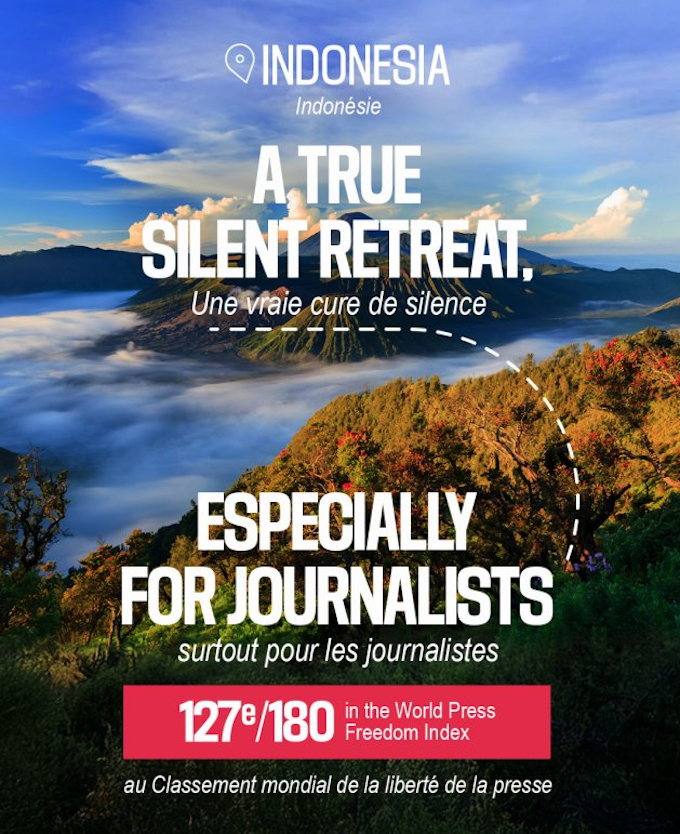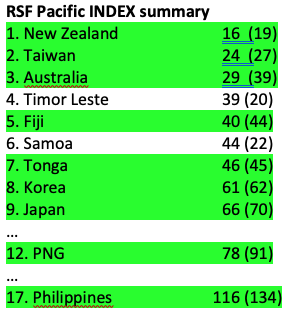
To mark the release of the 2025 World Press Freedom Index, Reporters Without Borders (RSF) partnered with the agency The Good Company to launch a new awareness campaign that puts an ironic twist on the glossy advertising of the tourism industry.
Three out of six countries featured in the exposé are from the Asia Pacific region — but none from the Pacific Islands.
The campaign shines a stark light on the press freedom violations in countries that seem perfect on postcards but are highly dangerous for journalists, says RSF.
- READ MORE: Fiji media welcomes credible news services, but not ‘pop-up propagandists’, says Simpson
- PINA on World Press Freedom Day – facing new and complex AI challenges
- Rabuka salutes Fiji media but warns against taking freedom for granted
- NZ fares well in latest RSF press freedom index as authoritarian regimes stifle Asia-Pacific media
- RSF 2025 World Press Freedom rankings
- RSF World Press Freedom Index 2025: economic fragility a leading threat to press freedom
It is a striking campaign raising awareness about repression.
Fiji (44th out of 180 ranked nations) is lucky perhaps as three years ago when its draconian media law was still in place, it might have bracketed up there with the featured “chilling” tourism countries such as Indonesia (127) — which is rapped over its treatment of West Papua resistance and journalists.
Disguised as attractive travel guides, the campaign’s visuals use a cynical, impactful rhetoric to highlight the harsh realities journalists face in destinations renowned for their tourist appeal.
Along with Indonesia, Greece (89th), Cambodia (115), Egypt (170), Mexico (124) and the Philippines (116) are all visited by millions of tourists, yet they rank poorly in the 2025 World Press Freedom Index, reports RSF.
‘Chilling narrative’
“The attention-grabbing visuals juxtapose polished, enticing aesthetics with a chilling narrative of intimidation, censorship, violence, and even death.
“This deliberately unsettling approach by RSF aims to shift the viewer’s perspective, showing what the dreamlike imagery conceals: journalists imprisoned, attacked, or murdered behind idyllic landscapes.”
The RSF Index 2025 teaser. Video: RSF
Indonesia is in the Pacific spotlight because of its Melanesian Papuan provinces bordering Pacific Islands Forum member country Papua New Guinea.
Despite outgoing President Joko Widodo’s 10 years in office and a reformist programme, his era has been marked by a series of broken promises, reports RSF.
“The media oligarchy linked to political interests has grown stronger, leading to increased control over critical media and manipulation of information through online trolls, paid influencers, and partisan outlets,” says the Index report.
“This climate has intensified self-censorship within media organisations and among journalists.
“Since October 2024, Indonesia has been led by a new president, former general Prabowo Subianto — implicated in several human rights violation allegations — and by Joko Widodo’s eldest son, Gibran Rakabuming Raka, as vice-president.
“Under this new administration, whose track record on press freedom offers little reassurance, concerns are mounting over the future of independent journalism.”
Fiji leads in Pacific
In the Pacific, Fiji has led the pack among island states by rising four places to 40th overall, making it the leading country in Oceania in 2025 in terms of press freedom.

Both Timor-Leste, which dropped 19 places to 39th after heading the region last year, and Samoa, which plunged 22 places to 44th, lost their impressive track record.
Of the only other two countries in Oceania surveyed by RSF, Tonga rose one place to 46th and Papua New Guinea jumped 13 places to 78th, a surprising result given the controversy over its plans to regulate the media.
RSF reports that the Fiji Media Association (FMA), which was often critical of the harassment of the media by the previous FijiFirst government, has since the repeal of the Media Act in 2023 “worked hard to restore independent journalism and public trust in the media”.
In March 2024, research published in Journalism Practice journal found that sexual harassment of women journalists was widespread and needed to be addressed to protect media freedom and quality journalism.
In Timor-Leste, “politicians regard the media with some mistrust, which has been evidenced in several proposed laws hostile to press freedom, including one in 2020 under which defaming representatives of the state or Catholic Church would have been punishable by up to three years in prison.
“Journalists’ associations and the Press Council often criticise politicisation of the public broadcaster and news agency.”
On the night of September 4, 2024, Timorese police arrested Antonieta Kartono Martins, a reporter for the news site Diligente Online, while covering a police operation to remove street vendors from a market in Dili, the capital. She was detained for several hours before being released.
Samoan harassment
Previously enjoying a good media freedom reputation, journalists and their families in Samoa were the target of online death threats, prompting the Samoan Alliance of Media Professionals for Development (SAMPOD) to condemn the harassment as “attacks on the fourth estate and democracy”.
In Tonga, RSF reports that journalists are not worried about being in any physical danger when on the job, and they are relatively unaffected by the possibility of prosecution.
“Nevertheless, self-censorship continues beneath the surface in a tight national community.”
In Papua New Guinea, RSF reports journalists are faced with intimidation, direct threats, censorship, lawsuits and bribery attempts, “making it a dangerous profession”.
“And direct interference often threatens the editorial freedom at leading media outlets. This was seen yet again at EMTV in February 2022, when the entire newsroom was fired after walking out” in protest over a management staffing decison.
“There has been ongoing controversy since February 2023 concerning a draft law on media development backed by Communications Minister Timothy Masiu. In January 2024, a 14-day state of emergency was declared in the capital, Port Moresby, following unprecedented protests by police forces and prison wardens.”
This impacted on government and media relations.
Australia and New Zealand
In Australia (29), the media market’s heavy concentration limits the diversity of voices represented in the news, while independent outlets struggle to find a sustainable economic model.
While New Zealand (16) leads in the Asia Pacific region, it is also facing a similar situation to Australia with a narrowing of media plurality, closure or merging of many newspaper titles, and a major retrenchment of journalists in the country raising concerns about democracy.
Pacific Media Watch collaborates with Reporters Without Borders.













































